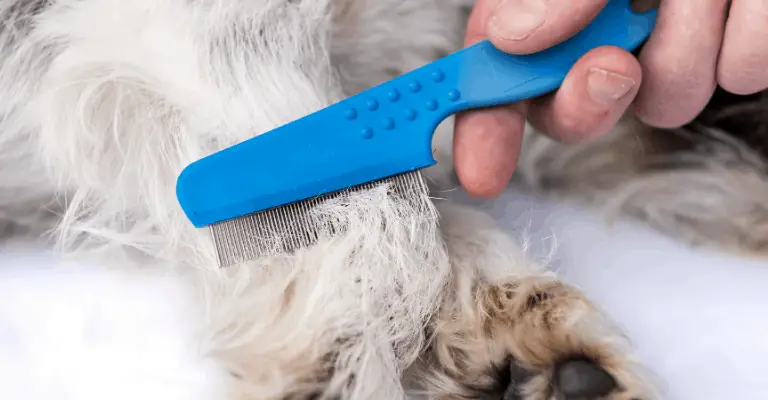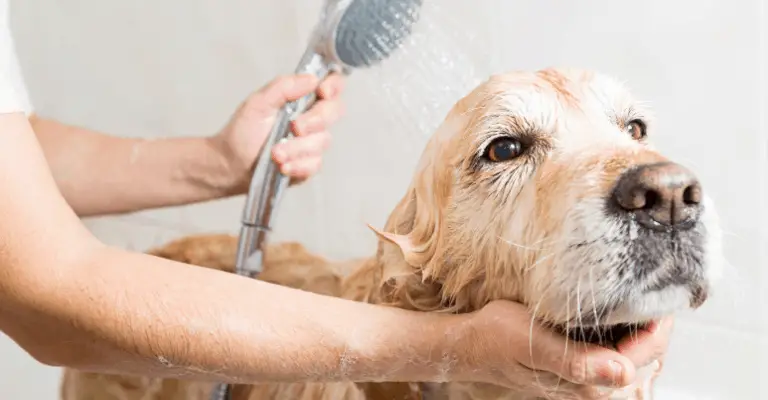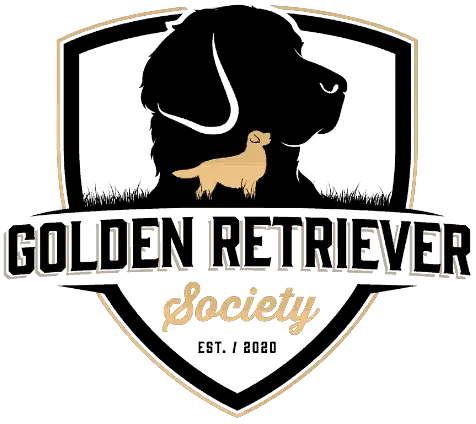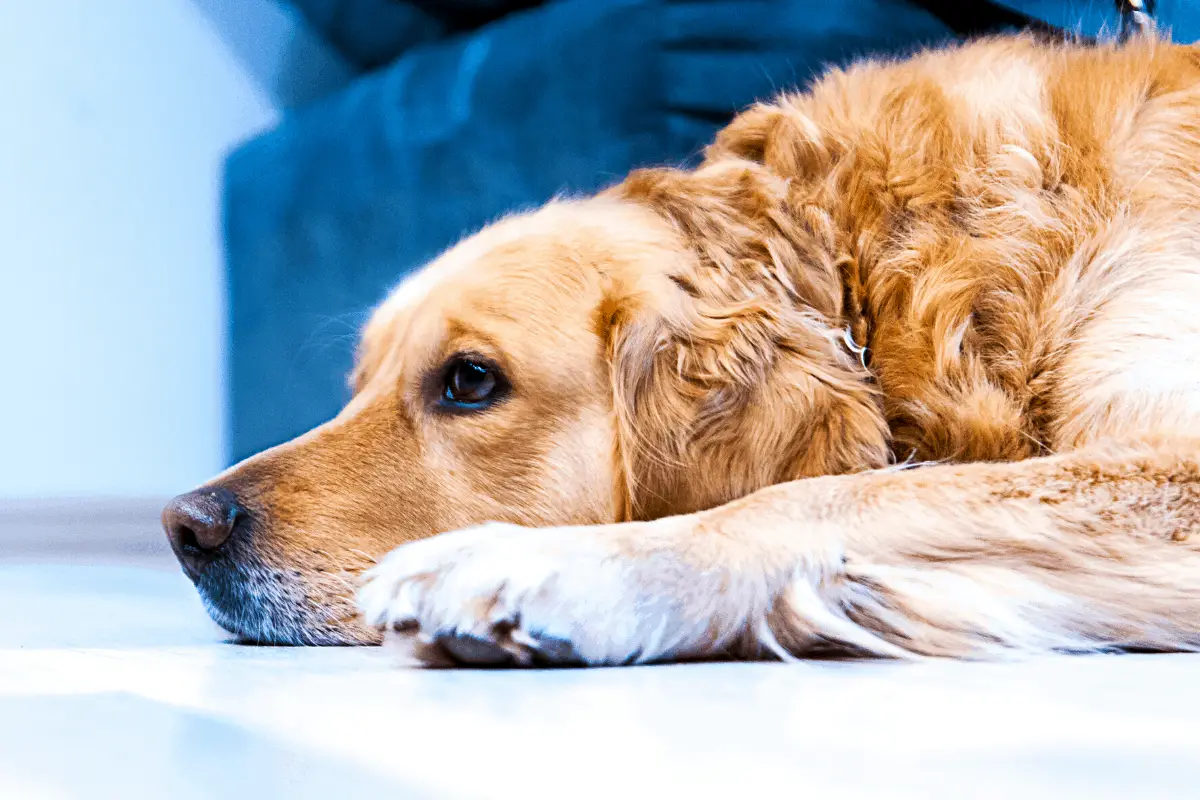Dandruff can be a nuisance to both dogs and people. If you have been finding flakes on your Golden Retriever, the furniture, and your clothes, then read on to find out the causes and the treatments.
Table of Contents
Understanding Dog Dandruff
Dogs will normally shed dead skin cells, but it becomes a problem when there is an excessive production of the dead skin cells in the haircoat. This is often accompanied by an increased production of sebum, or oils in the skin, or the opposite where the skin is really dry.
It can also be a combination of excessive oils and dry skin. When your Golden Retriever has dandruff, you will find varying amounts of small white flakes in the fur. Sometimes called Seborrhea, these flakes can cause itchiness in your dog, often getting bad enough to cause inflammation, redness, or irritation. Simply put, dandruff is a collection of extra dead skin cells in the haircoat.
There are primary and secondary causes of dandruff in dogs. Primary causes are rare, inherited conditions. There is a long list of common secondary causes. We will go into more details of the most common causes of dandruff in Golden Retrievers (and other dogs) and discuss some general treatments and ways to support your dog’s skin.
Primary Dandruff
Primary dandruff, or primary seborrhea, is an inherited condition that causes an increased production of dead skin cells or oils in the skin.
It is usually seen in dogs under one year of age. Golden Retrievers can get a primary dandruff condition called Ichthyosis. This is a genetic mutation that causes scaly, flakey skin, most commonly in puppies, but also seen in adults. Puppies often grow out of this condition but if they don’t, it can usually be treated with moisturizers and skin soothers.
Secondary Dandruff
Secondary dandruff, or secondary seborrhea, is dandruff that develops due to another skin disorder. Secondary dandruff can be cured by treating the underlying skin condition once it is identified.
Here are some disorders that can cause secondary dandruff.
External Parasites

There are many different kinds of parasites that can be found on your dog’s skin. Below are a few of the common culprits.
Fleas
Fleas are tiny jumping bugs that feed on animal’s blood and will cause your dog to be very itchy. Fleas are visible with the naked eye and easily treated with various flea preventative products.
Scabies
Sarcoptic mange, or scabies, causes severe itchiness and skin irritation leading to dandruff. Demodex mites cause hair loss and dandruff.
Cheyletiellosis
Cheyletiellosis is caused by a mite and is known as walking dandruff since the mites move under the skin flakes.
Your veterinarian will be able to diagnose these conditions through various skin tests and will treat your dog for mite infections with topical and oral medications.
Allergies
Allergies are most often environmental or food-related, but can also be caused by contact irritants or topical parasites such as fleas.
Sometimes allergies are specific to a certain season, whether it is a cold and dry environment, a hot and humid environment, or the various pollens found during the season.
Allergies cause extreme itchiness which leads to skin irritation, inflammation, redness, dandruff, and even skin infections. There are special blood and skin tests to determine your dog’s allergies.
Treating allergies requires a multi-modal approach. The keys are to find and treat the cause of the allergy, stop the itching, treat any secondary infections, and support the skin with moisturizing supplements.
Food allergies are treated with a special diet change depending on the protein causing the allergy.
Contact allergies are treated by removing the source causing the irritation.
Flea allergies are treated by treating and removing the fleas.
You will find dandruff in many dogs with allergies because there is a disruption in their skin barrier due to the allergy and they are licking, chewing, or scratching at their skin.
Skin Infection
Dogs can get skin infections caused by bacteria or fungus, most commonly yeast. These skin infections are usually brought on after the skin barrier has been disrupted by excessive itching.
Sometimes, dogs can get bacteria or fungus on their skin after swimming, if they have a dirty or matted haircoat, wounds, or allergies.
Skin infections are treated with various topical and oral antibacterial and antifungal medications.
Ringworm is a common type of topical skin fungus that can cause skin flaking. These infections are diagnosed through various skin tests and cultures and are treated with topical and/or oral antifungal medications depending on the severity.
Endocrine Disorders
The two most common endocrine disorders that result in dandruff are hypothyroidism and hyperadrenocorticism, commonly known as Cushing’s disease.
Patients with these diseases are often found to have dry, flakey skin and sometimes a thin haircoat with associated hair loss. These diseases are diagnosed through various blood tests, and treatment in these cases starts with treating the underlying disease.
Poor Nutrition
If your dog isn’t getting the right nutrients in their diet, the result will be a dull, dry, flakey, and otherwise unhealthy haircoat and skin.
Most complete and balanced dog foods contain the appropriate nutrients to keep your dog’s skin and haircoat healthy. However, if you are feeding your dog a low-quality food, it may be lacking in important ingredients such as omega-3 fatty acids or vitamin E.
Make sure you are feeding your dog high quality foods. Purina Pro Plan dog foods are a great start, and they make some for about every type of dog.
Immune-Mediated Diseases
There are several immune-mediated diseases where the body destroys normal skin cells or sebaceous glands, causing abnormalities such as dandruff, too much or too little oil in the skin, disruption of the layers of skin, wounds, and sores.
These diseases are diagnosed through blood tests and skin biopsies and are treating with various medications and supplements.
Treatments For Dandruff

Since most cases of dandruff are secondary to another disorder, the first step is treating the underlying skin condition. This will often include various topical and oral medications.
In addition to the previously recommended treatments for specific conditions, the following are broad suggestions for keeping your Golden Retriever’s skin and haircoat sleek, shiny, soft, and healthy.
- Bathing: Use a mild and unscented aloe or oatmeal soothing shampoo with lukewarm water. Make sure to lather up your dog well and rinse the shampoo thoroughly. It is also important to make sure their hair dries properly.
- Grooming: Regular grooming with a good haircut, bath, and brushing will help keep your dog’s haircoat fresh.
- Omega-3 fatty acids: These oral fatty acid supplements have antioxidant and anti-inflammatory properties and are key in keeping the skin and haircoat healthy.
- Humidifier: If your home is dry and has static, simply adding a humidifier can help keep your dog’s skin and haircoat well-hydrated.
- Good quality diet: As previously mentioned, ensuring your dog is eating a well-balanced and nutrient rich diet can help prevent and solve many skin issues.
Conclusion
Overall, dandruff is a manageable condition once the underlying disease or disorder is identified and treated.
You can easily keep your Golden Retriever’s skin and haircoat healthy by following the tips and suggestions here and talking to your veterinarian if the symptoms are severe or don’t go away in a timely manner.
Visit our article Common Golden Retriever Health Issues to learn more about health problems in Golden Retrievers.

